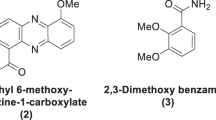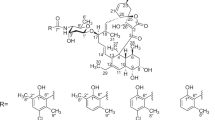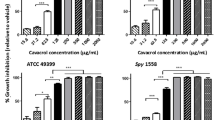Abstract
Streptomyces prasinus is found to produce at least five members of a new family of antibiotics, the prasinomycins. These are of high molecular weight and active in vitro against Gram-positive bacteria. Single subcutaneous doses provide prolonged protection to mice against Streptococcus pyogenes.
This is a preview of subscription content, access via your institution
Access options
Subscribe to this journal
Receive 51 print issues and online access
$199.00 per year
only $3.90 per issue
Buy this article
- Purchase on Springer Link
- Instant access to full article PDF
Prices may be subject to local taxes which are calculated during checkout
Similar content being viewed by others
References
Ettlinger, L., Corbaz, R., and Hutter, R., Arch. Microbiol., 31, 343 (1958).
Meyers, E., and Smith, D. A., J. Chromatog., 14, 129 (1964).
Macek, K., in Paper Chromatography (edit. by Hais, I. M., and Macek. K.), 821 (Academic Press, New York, 1963).
Archibald, W. J., J. Phys. Colloid. Chem., 51, 1204 (1947).
Author information
Authors and Affiliations
Rights and permissions
About this article
Cite this article
WEISENBORN, F., BOUCHARD, J., SMITH, D. et al. The Prasinomycins: Antibiotics containing Phosphorus. Nature 213, 1092–1094 (1967). https://doi.org/10.1038/2131092a0
Published:
Issue Date:
DOI: https://doi.org/10.1038/2131092a0
This article is cited by
-
Organophosphorus drugs (Review)
Pharmaceutical Chemistry Journal (1985)
Comments
By submitting a comment you agree to abide by our Terms and Community Guidelines. If you find something abusive or that does not comply with our terms or guidelines please flag it as inappropriate.



